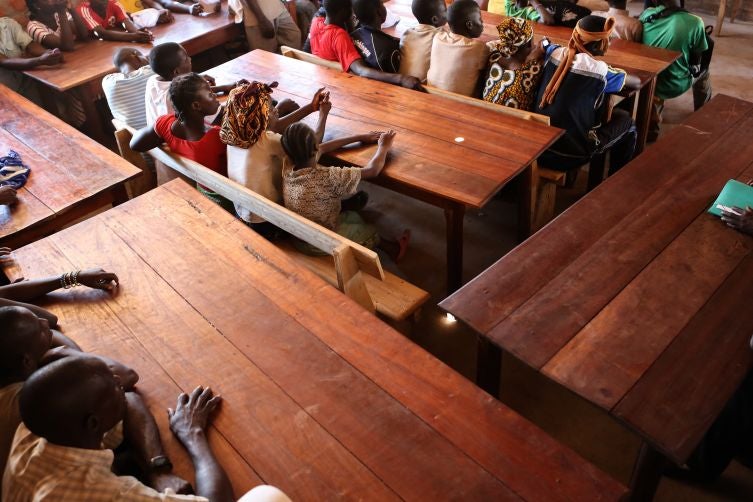Why we have to stay and help in this war-torn country
Now that fighting here in the Central African Republic is forcing thousands of families to flee their homes, Unicef's role is more important than ever.

Your support helps us to tell the story
From reproductive rights to climate change to Big Tech, The Independent is on the ground when the story is developing. Whether it's investigating the financials of Elon Musk's pro-Trump PAC or producing our latest documentary, 'The A Word', which shines a light on the American women fighting for reproductive rights, we know how important it is to parse out the facts from the messaging.
At such a critical moment in US history, we need reporters on the ground. Your donation allows us to keep sending journalists to speak to both sides of the story.
The Independent is trusted by Americans across the entire political spectrum. And unlike many other quality news outlets, we choose not to lock Americans out of our reporting and analysis with paywalls. We believe quality journalism should be available to everyone, paid for by those who can afford it.
Your support makes all the difference.
Please donate to our appeal for child soldiers here.
This is a desperately poor country with many challenges even in peaceful times: nearly 70 children under five die every day, and 41 per cent are stunted due to poor nutrition. The situation means people's access to basic services is even more constrained.
Although the security situation in CAR is very worrying, we remain 100 per cent committed to these children. Despite the fighting, our work with the 64 children released recently from armed groups continues; their safety and wellbeing is our priority, and we are looking to reintegrate them in their communities as soon as the fighting subsides.
So we want to reassure readers of The Independent that the donations they have made to support our work with child soldiers here will be well spent, despite the fighting. In many ways it is even more needed than it was before and we are hugely grateful for what has been given; and hope readers will continue to be generous.
(Watch our playlist of videos from the Christmas Appeal here)
Unicef is different to other organisations because of our mandate to work in all situations and encompass all aspects of child wellbeing and rights; whether it be in middle-income countries where we advocate for equity for all children, or whether it be in emergency situations such as CAR.
When a state is said to have “failed”, as is the situation in CAR now, Unicef ensures that basic social services keep functioning and that children don't miss their chance to develop, learn and be healthy during their most critical years.
When it comes to operating in an active conflict zone such as CAR, it may be necessary to evacuate some members of staff, but Unicef maintains a minimum presence based on experience in key areas including health, child protection, water and sanitation, so that even with limited staffing levels we can launch a humanitarian response as soon as access becomes available.
In CAR, as in all other countries, we have a dual role to play of negotiating (as part of the UN team) with government and other armed groups to create humanitarian corridors by which aid can be delivered, as well as carrying out rapid on-the-ground needs assessments; how many people are without shelter, water, food, medicine; and then with our partners, as well as support from Unicef in neighbouring countries, delivering aid by air or ground to the affected areas.
CAR is little known and receives very little in the way of international funding. Any money you can give will make a difference for children who are suffering at the hands of armed groups or who need support to make sure they can rebuild their lives successfully and safely in their communities. We will be here to make sure that is the case.
United Nations staff have been pulled out of the Central African Republic as rebel forces advance on the capital Bangui. A curfew is in force as citizens wait to see if the rebels, just 40 miles away, will attempt to take the capital. But Unicef staff are staying to care for 64 former child soldiers rescued from the militias and supported by readers of The Independent who have been donating to our Christmas Appeal for Unicef's work. The charity is the UN's children's fund but relies entirely on donations.
All Unicef's work with child soldiers in the CAR is funded by donations. Please be as generous as you can. Click here to donate. Text CHILD to 70030 to donate five pounds.
• £6 provides life-saving treatment for one child from fatal diarrhoea, pneumonia, or malaria, all diseases that the children are vulnerable to in the Central African Republic
• £15 pays for schooling for a child who has been rescued from an armed group – including providing all the books and stationary they need.
• £25 provides a child with all the essentials they need when they are first rescued. This ‘welcome kit’ includes clothes, underwear, toothbrush and toothpaste, soap, a blanket, mattress, and mosquito net.
• £62 provides vocational training to a child released from armed groups, providing them with a sustainable future
• £103 trains a teacher to help former child soldiers continue their education
• £150 pays for psychological support for one child who has been rescued
• £300 can buy enough toys for a centre for 50 rescued children to play with, to help them regain their childhood by having fun again
• £516 can support one child for a whole month. This covers the cost of everything they need at the rehabilitation centre, including care from dedicated and experienced staff, food, counselling, education, vocational training, and the costs for family reunification
Join our commenting forum
Join thought-provoking conversations, follow other Independent readers and see their replies
Comments